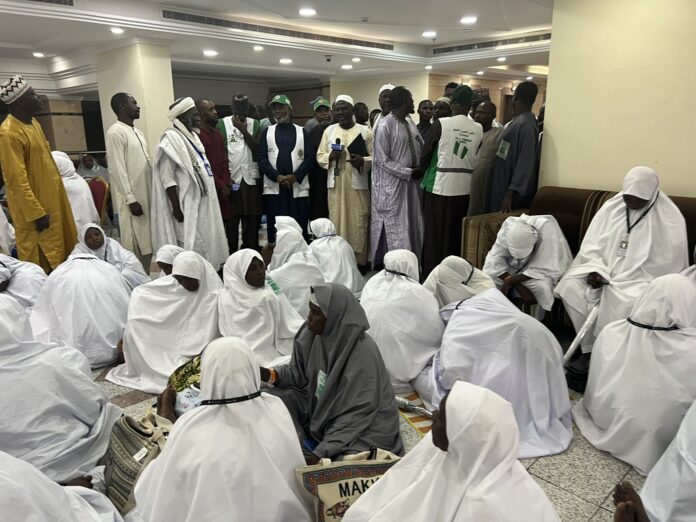As preparations for Hajj 2025 begin, a Nigerian civil society group has sounded the alarm over fluctuating exchange rates that threaten to destabilize the financial planning of pilgrims. The Independent Hajj Reporters (IHR), an organization focused on transparency in the Hajj and Umrah sector, has called on the Federal Government to peg a fixed dollar exchange rate specifically for Hajj transactions.
The IHR issued the plea in a statement signed by its National Coordinator, Ibrahim Muhammad, who emphasized that “80 percent of Hajj transactions are dollar-based.” According to Muhammad, the current volatility of the naira against the dollar makes it nearly impossible for Nigerian pilgrims to know the exact costs of their packages well in advance.
The Case for a Fixed Exchange Rate
Muhammad explained that Nigerian pilgrims pay their Hajj fares in naira, which are then converted to dollars at the official exchange rate before being transferred to Saudi-based service providers. However, the ever-changing forex rates disrupt this system, creating financial uncertainty.
“For example,” the statement noted, “the failure to peg the dollar at a fixed rate for the 2024 Hajj transactions led to a reduction in pilgrims’ Basic Travel Allowance (BTA). Pilgrims who paid for $500 in naira equivalent received only $400 during their airlift, a shortfall that inflicted untold suffering.”
This discrepancy, IHR said, left many pilgrims stranded and financially strained in Saudi Arabia. The group insists that setting a stable exchange rate for the upcoming Hajj will alleviate these challenges.
Impact on Pilgrims and NAHCON’s Role
The National Hajj Commission of Nigeria (NAHCON), the regulatory body overseeing Hajj operations, has also faced difficulties in managing these forex challenges. Without a predictable exchange rate, NAHCON struggles to calculate precise Hajj fares and coordinate payments to service providers abroad.
“NAHCON will find it difficult to compute the exact Hajj fare or dollar-based services without a specific government-approved forex rate for 2025 transactions,” Muhammad added.
The group also highlighted that efforts by NAHCON to pay some Saudi service providers in naira have not entirely solved the issue. These providers, in turn, must convert naira to dollars, a process still tied to fluctuating forex rates.
A History of Financial Strain
The call for intervention is not new. Hajj 2024 highlighted the severity of these financial challenges when the unstable exchange rate led to higher-than-expected costs for airfare, accommodations, and other services. Pilgrims who had budgeted carefully were blindsided by the additional expenses, creating widespread frustration.
Additionally, the reduction in BTA not only reduced pilgrims’ purchasing power but also created logistical hurdles, with some unable to afford basic necessities during their pilgrimage.
“We once again appeal to the Federal Government to peg the dollar to a fixed rate for Hajj 2025 transactions,” IHR’s statement reiterated. “This step will ensure certainty and stability in the Hajj exercise in Nigeria.”
Government’s Potential Role
While the Federal Government has yet to respond publicly, analysts suggest that pegging the dollar for Hajj transactions could ease financial pressures for both pilgrims and NAHCON. However, such a move would require careful coordination with the Central Bank of Nigeria (CBN), which manages the country’s forex policies.
Critics argue that allocating a fixed rate for Hajj transactions could strain the already tight dollar reserves in the country. Nevertheless, proponents believe it is a necessary concession to ensure that Nigerians can fulfill their religious obligations without undue financial stress.
A Broader Context of Economic Challenges
The broader economic context underscores the urgency of this appeal. Nigeria has faced persistent forex challenges, with the naira weakening significantly against the dollar in recent years. The rising cost of living, combined with high inflation rates, has made international travel more expensive for Nigerians.
Pilgrimages, once affordable for many, are now becoming a privilege only for the wealthy. The average cost of Hajj has skyrocketed, forcing many prospective pilgrims to reconsider their plans.
CSO’s Final Plea
The IHR’s call is a stark reminder of the financial difficulties ordinary Nigerians face in fulfilling their spiritual commitments. “Given the current financial difficulties and the high rise in the cost of Hajj fare, we once again appeal to the Federal Government to peg the dollar to a fixed rate,” the statement concluded.

